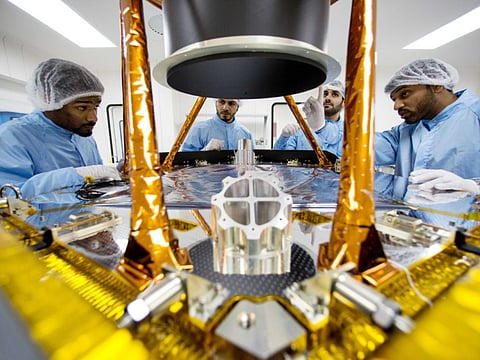Mars probe is but a step in UAE’s evolution
Realities dictate that UAE should be transitioning to a knowledge-focussed economy

Also In This Package
The UAE’s entry into the space age, as an emerging country, also sparked a lot of controversy. Because this particular field of enterprise was limited to the major powers, especially since it requires substantial financial, human and technological capital.
But those who believe in success that is shared rejoiced in this bold step by the UAE, while some failed countries and powers tried to distort the Mars project by various means. The importance of the Hope Probe and its future prospects underpin various aspects, not least the economic and technological advances from the UAE’s approach.
As the Mohammed Bin Rashid Space Centre is just a few metres away from the family’s home in Dubai, I have been following the progress of this project from its beginning. Established in April 2015, the MBRSC encompasses the Emirates Institution for Advanced Science and Technology, which was founded in 2006. The project, a modest one in its formative years, developed rapidly over the last few years. Managed and supervised by MBRSC, the UAE’s Hope Probe project expanded to include hundreds of highly qualified engineers and technicians, the training of Emirati astronaut Hazza Al Mansouri, and preparing for the launch to Mars.
In economic terms, no sector can be developed without sophisticated infrastructure, as proved by the Gulf experience. At the beginning of the discovery and flow of oil wealth, there were no industries in the GCC apart from a few handicrafts.
Gaps in infrastructure
Despite the availability of funds for development, the lack of infrastructure required intensive investments for rapid development. This led Gulf states to pump funds into the construction of power and water desalination plants, road networks, ports and airports, and which made it possible to develop several sectors simultaneously, including industrial, which was earlier limited to small and medium-sized industries. Later, the development extended to include advanced tech industries.
The right approach towards development begins with laying the infrastructure. And since the global economy is witnessing major shifts towards a knowledge-heavy economy, the UAE has begun to lay the foundations for this approach, without which it is not possible to talk about competitive economies. This means narrowing the knowledge gap with the developed nations.
Connect the dots
Some may ask a logical question: what does this argument have to do with the Mars probe? Simply because technology is indivisible. For example, physicists and mathematicians can innovate in the AI industry or in using new-age techniques in water desalination. Also, chemical engineers can contribute to the development of petrochem industries.
Proudly, most engineers and specialists in the MBRSC are Emiratis, which means preparation of a highly qualified cadre and equipping them with advanced technologies, in itself a major achievement.
And yet, the failed countries have come out with demeaning narratives that suggest foreign institutions and scientists contributed to preparing for the launch the Hope probe. However, this represents a strength for the project, not a weakness, because the right start is to build on others’ findings and benefit from their experience and expertise to catch up. Not always should starting from scratch be the sole goal.
It won’t be long to see the creation of local forces qualified to lead the national economy in knowledge industries. The MBRSC was established to contribute towards the development of various economic sectors within the UAE and beyond, using data from UAE satellites and high-tech applications related to space science. All in the knowledge that many natural resources and minerals could yet be discovered in outer space...
The Centre also looks forward to making the UAE a leader in reshaping the Arab region for a new era of scientific discoveries. This indicates a seismic shift to transform the region into a net contributor to the development of post-industrial economies and not remain a mere consumer of such tech and its applications.
This is how all investments will be measured in future.
- Mohammed Al Asoomi is a specialist in energy and Gulf economic affairs.









